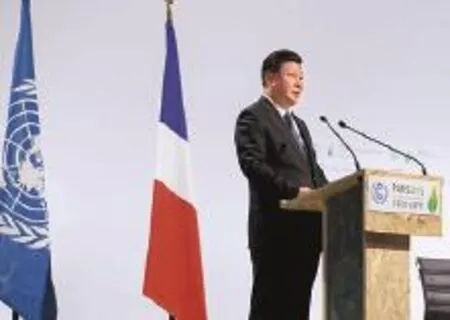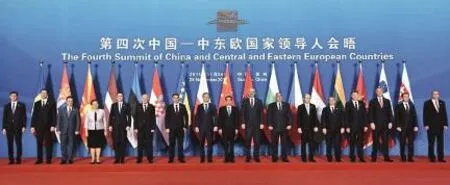Exchanges
Exchanges

China Contributes Wisdom to Global Environmental Governance
Chinese President Xi Jinping attended on November 30, 2015 the opening ceremony of the Paris Climate Change Conference. Xi said in his speech that the Paris Conference should reach a comprehensive, balanced, powerful, and binding climate change agreement. The Paris agreement should focus on strengthening post-2020 global actions on tackling climate change, and add impetus to promoting sustainable global development. The Paris Conference should promote more sharing and bearing of the responsibilities of all countries, especially by the developed ones, to achieve reciprocity and win-win results. It should ensure effective compliance with and implementation of international rules, adhere to the principles of democracy, equality and justice, build an international rule of law, and abide by the principle of common but differentiated responsibilities. It should allow all countries to seek the solutions most suited to their specific national conditions.
Xi stressed that China has always been proactive in the global cause of tackling climate change, and that it has become the world’s largest country in the practice of energy conservation and utilization of new and renewable energy. China will implement the development concepts of innovation, coordination, environmental protection, opening-up and sharing to form a new pattern of modernization that incorporates the harmonious development of man and nature.
Leaders of about 150 countries attended the opening of the Paris Climate Change Conference. All agreed that, as a common challenge to humankind, climate change affects our future and requires the joint efforts of all parties.
China, Central and Eastern European Countries Eye Closer Ties
Chinese Premier Li Keqiang attended on November 24, 2015 in Suzhou, Jiangsu Province, together with the leaders of 16 Central and Eastern European countries, the Fourth Summit of China and Central and Eastern European Countries. Li proposed in his speech implementating the roadmap for advancing cooperation, promoting synergy between development strategies, and improving interconnectivity. He also called for new cooperative examples of production capacity and investment and financing, enhancement of the growth of both trade and investment, and expanding people-to-people and cultural exchanges.
Participating leaders confirmed that Central and Eastern European nations enjoy sound relations with China, and that the 16+1 cooperation displays great potential and robust dynamics. Based on a concrete bilateral cooperation, Central and Eastern European countries are willing, together with China, to dock development strategies, innovate cooperation modes, and expand mutually beneficial and practical cooperation in politics, economy and people-to-people exchanges; moreover to implement cooperation projects including land-sea connectivity, and to push the 16+1 cooperation to a new level.
At the close of the summit, China and the 16 Central and Eastern European countries jointly issued the Medium-term Plan for Cooperation between China and Central and Eastern European Countries, and the Suzhou Guidelines for Cooperation between China and Central and Eastern European Countries.

China-Russia Ruling Parties Pledge Expanded Exchanges
The fifth meeting of the China-Russia ruling parties dialogue mechanism between the Communist Party of China (CPC) and United Russian Party took place on December 1, 2015 in Beijing, under the theme “the party’s ruling ability and modernization of the national governance system.”
The two parties should make full use of the dialogue mechanism to exchange experience and learn from each other, and further develop bilateral relations, member of the Standing Committee of the Political Bureau of the 18th CPC Central Committee Liu Yunshan said.
Chinese President Xi Jinping, also general secretary of the CPC Central Committee, said in his congratulatory letter to the meeting that the party-to-party exchange plays a“unique” role in the development of bilateral relations, and that the dialogue mechanism and forum constitute an effective platform for discussing strategic issues such as bilateral relations and ruling party construction. Xi added that the meeting would help the two parties strengthen capacity-building and ability in national governance.
Russian President Vladimir Putin echoed Xi in his congratulatory letter, saying that the two ruling parties’ cooperation plays an important role in bilateral ties, including promoting solutions to major issues between the two countries and coordinating their stances on regional and international affairs.
Xi Jinping Breaks New Ground in China-African Relations
Chinese President Xi Jinping paid a state visit from December 1 to 5, 2015, to Zimbabwe and South Africa, and chaired the Johannesburg Summit of the Forum on China-Africa Cooperation (FACOC).
President Xi, along with 50 heads of state, government heads or representatives, and the chairman of the African Union Commission, spoke glowingly at the Summit of the China-Africa friendship, and laid plans for strategy development and a new era of China-Africa win-win cooperation and mutual growth. The summit approved The Declaration of the Johannesburg Summit of the FACOC and FACOC: Johannesburg Plan of Implementation (2016-2018), which acts as the framework document guiding the China-Africa friendly relationship under new circumstances.
Chinese and African leaders agreed to elevate the Sino-African relationship to a comprehensive strategic cooperative partnership featuring political equality and mutual trust, win-win economic cooperation and cultural exchanges, closer ranks and help with one another’s security, and cemented unity on international affairs with the African continent as a whole.
The Johannesburg Summit achieved fruitful results. The upgrade of relations and the cooperation framework laid a solid foundation for development of the Sino-African relationship. The summit marked a new milestone and signified a new era of Sino-African relations.

